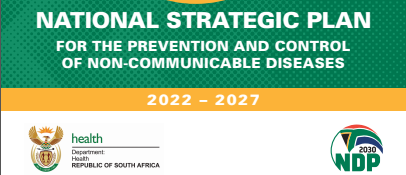
Non-communicable diseases (NCDs) appear to be rising in priority for the first time in more than two decades since the publication of the South African National Development Plan (NDP). The recent NDP 10-year review seems to frame NCDs in a different light by making this recommendation:O
Department of Health should implement the legislative and regulatory interventions recommended by the Strategic Plan for the Prevention and Control of Non-Communicable Diseases.” page 39

The recommendation appears to open the way for a national policy shift, moving NCDs out of the rut that considers them solely lifestyle conditions managed by a mixture of behaviour changes with a mix of policy and fiscal measures. This NDP framing institutionalised the limited allocation of national budget resources for NCDs interventions officially sanctioned as primordial and primary prevention. In reality, it resulted in NCD denialism despite them being the leading cause of death in South Africa since 2009, once ARVs impacted the tragic and callous loss of life due to HIV.
The use of the term lifestyle conditions is unacceptable for the HIV and TB community. People living with NCDs+ find it equally demeaning as it places the responsibility mainly on the person to live a better life.This bogus notion disregards the wider or social determinants of health and a public health system that fails to prevent and treat NCDs in a comprehensive way in all primary care facilities.
Very little changed for 20 years with subsequent NDP iterations of health priorties which continue to feature the Millennium Development Agenda identified conditions and South Africa’s much delayed and controversial version of universal health coverage. National Health Insurance (NHI) draft legislation focuses only finacial mechanism and fails to deal with quality and equity for NCDs and mental health.
Be still my heart NCDs equity indicator
Being a cynic in NCDs matters, when I look at policies I look first at the list of acronyms which usually feature up front. Very quickly I notice that the acronym NCDs does not appear in this standard feature South African policy documents. In most health-related policies, NCDs, the acronym, is missing with little or no mention within the policy and, unsurprisingly, even less action.
I made my first indicator of NCDs policy equity to be the inclusion of NCDs in the list of acronyms. Why? It give a snapshot of the framing from the perspective of the policymakers. So it is a huge milestone to have NCDs finally made the acronym indicator cut. NCDs has appear in this review and, be still my heart, in the recently update HIV/TB & STIs national strategic plan. Using the criterion in reverse, it is intriguing that neither HIV nor AIDS makes this list, but TB does. Perhaps is shows the extent to which HIV is institutionalised in South African society.
In a related victory, NCDs featured for the first time in the acronym list of the HIV, TB and STIs stratgic plan!
Hope springs eternal
It took the South African NCDs+ Alliance 10 years and lots of activism to be included in the development of the NCDs+ National Strategic Plan. Real blood, sweat and tears stuff. We had to take extreme measures including delaying tactics and staking sham policy consultations. After 5 years of delays it was finally passed and launched last year. It does allow scope for increasing the priority of NCDs prevention and treatment. However, without futher clarification of the NDP review recommendation is nuanced. What do “legislative and regulatory interventions” mean? Is it just another way of maintaining the status quo?
Make this cynic think paranoid thoughts. Especially as the health minister and officials havent responded to letters for years. What do you think?


The Control of Tobacco Products and Electronic Delivery Systems Bill, 2018 (Tobacco Control Bill) has reached the Cabinet which is a milestone in its passage into law. Here is the update on the progress to enact the Tobacco Control Bill
- The 1st pre-Cabinet Committee (Technical Working Committee) recommended the Bill to the next committee.
- The 2nd pre-Cabinet Committee of the Deputy Director Generals of the 18 national departments in the Social Cluster recommended the Bill progress.
- Following the 1 August 2022 NDOH presentation of the Bill to the Forum of the Directors-Generals (FOSAD) approved the Bill to be considered by the Cabinet.
Although much remains to be done in Cabinet and Parliament (National Assembly and the National Council of Provinces) before the Bill is enacted, progress at FOSAD is a milestone. The progress also highlightsthe important roles the various stakeholders play.

 11 April 2022
11 April 2022
Minister in the Presidency, Mondli Gungubele, says a key issue commissioners appointed to the National Planning Commission (NPC) will be expected to address is the slow progress in the implementation of the National Development Plan (NDP) and to identify solutions to make sure that the country fast tracks its route to the NDP goals.
The Minister, who serves as chairperson of the NPC, was speaking during a first media briefing of the third NPC which was appointed in December last year. “One of the shortcomings that [the NPC] has identified…was the incapacity of the state to implement the proposals of the NDP. This often combined with poor leadership that pay lip-service to the NDP without understanding its goals has acted as an obstacle to implementation of developmental objectives.
“As government, we are clear that the greatest challenge has been around implementation and in the discussions held to date, this was my emphasis to guide the discussions,” Gungubele said.
The National Development Plan – which was adopted ten years ago – was created as an action plan for government to tackle several challenges facing the country including unemployment, poverty, inequality, safety and healthcare. “The NDP was designed to change the lives of all South Africans by taking a comprehensive approach where the reality of 2012 [would] become a different one by 2030. We must recognise that we have not met the goals as we intended 10 years ago, that is true.
“Recognising this is the first step to asking: how do we do things differently to change the trajectory that we are on. This is where [the commission] will assist us as we tackle this challenge where implementation of our plans has not met the targets,” he said.
NPC Deputy Chairperson, Professor Tinyiko Maluleke, said the third NPC begins its term at a precarious moment in our country’s history and the “tall order” it faces in bringing the country closer to what the NDP envisioned. “There is, of course, a reason why we are called the NPC…and not the National Implementation Commission. But if implementation is slow or non-existent, planning alone, is clearly insufficient. Given that ours is a tenure that is closest to the finish line of 2030, we cannot afford to be dismissive, smug or philosophical about implementation.
“We have to probe why it is, why it has been so hard to coordinate, to cohere, to cascade down, to streamline and pinpoint down the necessary catalytic interventions which will embed and institutionalise the NDP within the departmental, provincial and municipal plans,” he said.
Professor Maluleke said the NPC will also give attention to identifying catalytic areas for government to pursue. “Countries which have successfully achieved their national developmental goals and targets are those at the heart of whose plans are clear catalytic priorities around which the whole state machinery is mobilized.
“The third NPC will help to enhance the ability of the state to identify and pursue catalytic priorities which will expedite the attainment of NDP goals,” he said. According to Maluleke, another focus area for the NPC will be mobilizing the country’s support for the NDP and its goals.
“Although the NDP is a plan for the whole country, it has not been sufficiently adopted by all sectors at all times. As we mark its tenth anniversary in September, the NPC is urging all South Africans to rally behind the NDP to ensure its implementation and to call government to account on the basis of the promise contained in the NDP. “To that end, the NPC is committed to building partnerships broadly across society and to pursing engagements that should ensure active citizenry and strong leadership for development,” he said.






 11 April 2022
11 April 2022